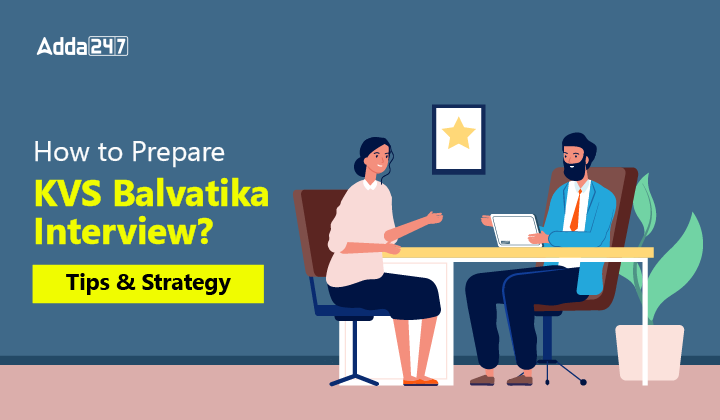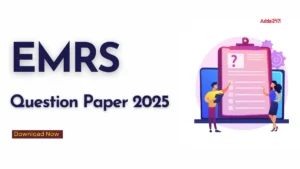Table of Contents
The KVS Balvatika interview has begun to recruit eligible candidates on a contractual basis. The KVS Balvatika Selection Process 2023 includes submission of application, interview and document verification. Therefore, candidates applying for the KVS Balvatika Teaching Posts must prepare for the Interview to be able to crack it on the first attempt. Candidates must go through the tips and strategies to ace the KVS Balvatika Interview effectively as mentioned in the following articles.
How to Prepare KVS Balvatika Interview?
Preparing for a KVS Balvatika interview requires a combination of thorough knowledge of the subject matter, effective communication skills, and a clear understanding of the role candidates are applying for. As the candidates will require to teach students of age group 3 years to 6 years, they must possess some crucial qualities and the KVS Balvatika interview will be designed to assess these important qualities in candidates. Here are some tips and strategies to help you prepare for your KVS Balvatika interview that will bring out the appropriate teaching qualities in you effectively.
KVS Recruitment 2025 Out for 9156 – Check All Details
Research the KVS Balvatika Curriculum
Familiarize yourself with the curriculum and teaching methods used in KVS Balvatika. Understand the subjects taught, the age group of the students, and any specific teaching methodologies or approaches emphasized by KVS.
Review Educational Qualifications and Experience
Ensure that you meet the educational qualifications required for the position you are applying for. Review your relevant teaching experience, including any previous work in Balvatika or similar settings. Be prepared to discuss your experiences and how they have shaped your teaching approach.
Understand Child Development and Pedagogy
Familiarize yourself with theories and principles of child development, learning styles, and teaching strategies appropriate for the age group of Balvatika students. This will demonstrate your understanding of how children learn and your ability to adapt your teaching methods accordingly.
Demonstrate Effective Communication Skills
A key aspect of being a successful teacher is the ability to effectively communicate with students, parents, and colleagues. Practice your communication skills, both verbal and non-verbal, and be prepared to provide examples of how you have effectively communicated in the past.
Showcase Your Classroom Management Skills
Balvatika environments require teachers to maintain discipline and create a positive learning atmosphere while enhancing the engagement of children in the activities. Prepare examples of how you have successfully managed classrooms, handled challenging behaviour, and created a safe and inclusive learning environment.
Stay Updated with Current Education Trends
Keep yourself updated with the latest trends and developments in education. Be aware of any new teaching methodologies, technologies, or initiatives that KVS Balvatika may be implementing. This demonstrates your commitment to ongoing professional development and your enthusiasm for staying current in the field.
Practice Mock Interviews
Consider practising mock interviews with a friend or colleague who can provide constructive feedback. This will help you become more comfortable with the interview process and refine your responses.
Be Confident and Authentic
Finally, be confident in your abilities and showcase your passion for teaching young children. Be authentic and let your personality shine through during the interview. Show enthusiasm for working in a Balvatika setting and your commitment to providing a nurturing and enriching learning environment.
Common Questions Asked in KVS Balvatika Interview
During a KVS Balvatika interview, the interview panel may ask a variety of questions to assess your suitability for the position of KVS Balvatika Teacher. Here are some common questions that you may encounter during the KVS Balvatika Interview.
- Can you tell us about your experience working with children aged 3- to 6-year age group?
- How do you ensure that your teaching methods align with the developmental needs of young children?
- What teaching strategies do you employ to engage and motivate young learners in the classroom?
- How do you create a positive and inclusive learning environment for children in a Balvatika setting?
- How do you assess and track the progress of children’s learning in your classroom?
- How do you handle challenging behaviour in young children? Can you provide an example of a situation you have successfully managed?
- How do you incorporate play-based learning into your lessons for 3 to 6-year-old children?
- Can you describe a lesson or activity that you have designed to teach a specific concept to young children effectively?
- How do you involve parents or guardians in their child’s learning and maintain effective communication with them?
- How do you differentiate instruction to meet the individual needs of children with diverse abilities and learning styles?
- Can you share an example of a project or activity that promotes holistic development (cognitive, social, emotional, and physical) in young children?
- How do you maintain classroom management and ensure a safe and orderly environment for young children?
Possible Challenges Faced While Teaching KVS Balvatika Students?
Teaching children aged 3 to 6, the targetted age group of KVS Balvatika can be challenging due to their short attention spans, limited communication skills, and varying developmental stages. Teachers need to address physical restlessness, lack of focus on academics, and separation anxiety. Nutrition and health concerns may arise, and motor skill development is important. Involving parents in their education is vital for their overall growth. Despite the challenges, teaching young children is a rewarding experience with creativity, patience, and understanding. Candidates preparing for the KVS Balvatika Interview 2023, must keep these challenges in their mind while preparing for the interview session.



 UP LT Grade Teacher Question Paper 2025 ...
UP LT Grade Teacher Question Paper 2025 ...
 UP LT Grade Teacher Previous Year Questi...
UP LT Grade Teacher Previous Year Questi...
 EMRS Question Paper 2025 Released, Downl...
EMRS Question Paper 2025 Released, Downl...












